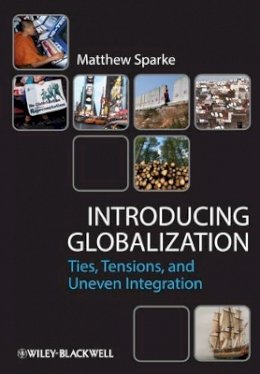
Stock image for illustration purposes only - book cover, edition or condition may vary.
Introducing Globalization
Matthew Sparke
€ 127.76
FREE Delivery in Ireland
Description for Introducing Globalization
Hardcover. Designed specifically for introductory globalization courses, Introducing Globalization helps students to develop informed opinions about globalization, inviting them to become participants rather than just passive learners. Num Pages: 508 pages, illustrations, maps, tables, further reading, bibliography. BIC Classification: JFFS. Category: (UF) Further/Higher Education. Dimension: 252 x 178 x 31. Weight in Grams: 1030.
Designed specifically for introductory globalization courses, Introducing Globalization helps students to develop informed opinions about globalization, inviting them to become participants rather than just passive learners.
- Identifies and explores the major economic, political and social ties that comprise contemporary global interdependency
- Examines a broad sweep of topics, from the rise of transnational corporations and global commodity chains, to global health challenges and policies, to issues of worker solidarity and global labor markets, through to emerging forms of global mobility by both business elites and their critics
- Written by an award-winning teacher, and enhanced throughout by numerous empirical examples, maps, tables, an extended bibliography, glossary of key terms, and suggestions for further reading and student research
- Supported by additional web resources – available upon publication at www.wiley.com/go/sparke – including hot links to news reports, examples of globalization and other illustrative sites, and archived examples of student projects
Engage with fellow readers of Introducing Globalization on the book's Facebook page at www.facebook.com/IntroducingGlobalization, or learn more about this topic by enrolling in the free Coursera course Globalization and You at www.coursera.org/course/globalization
Product Details
Format
Hardback
Publication date
2013
Publisher
John Wiley and Sons Ltd United Kingdom
Number of pages
508
Condition
New
Number of Pages
512
Place of Publication
Hoboken, United Kingdom
ISBN
9780631231288
SKU
V9780631231288
Shipping Time
Usually ships in 7 to 11 working days
Ref
99-50
About Matthew Sparke
Matthew Sparke is Professor of Geography and International Studies at the University of Washington, where he also serves as the Director of the undergraduate program in Global Health. He has authored over 60 scholarly publications, including the book In the Space of Theory (2005), but he is also dedicated to teaching about globalization as well as writing about it. He has multiple awards for his work as a teacher, including the lifetime Distinguished Teaching award from the University of Washington.
Reviews for Introducing Globalization
“Sparke models inquiry into taken-for-granted concepts or events through rich understanding and questioning. More importantly, he reframes spatial theory as the starting point of social studies conversations about globalization. Rather than accept the inevitability of globalization, he depicts the inevitability of inequity. He examines how inequities become actualized in lives through geopolitical and geoeconomic infrastructure. He encourages us to reconsider the relationships between disciplines, contending that disciplined inquiry enables simplistic understanding. He allows geography and spatial theory to be a way of understanding the world, a lens that resonates across the social studies. The book importantly segments a variety of explanatory moments to allow readers without a strong economics background to understand economic principles. It is a lack of economic understanding that makes global policy discussions unintelligible to the general public. In the process, he ultimately constructs the globally minded citizen. While his brand of global thinking (and citizenship) has a problematic Western perspective, it also utilizes a critical lens that requires awareness of these contradictions and their implications for ourselves and others. The spatial thinking highlighted throughout this review relies on thinking across the disciplines to attend to how, where, and why places are constructed independently and interdependently across scales and time. Rather than assuming that places are knowable, rejecting the three myths encourages questions about what has been made invisible, how new places come to exist, the kinds of interactions that occur therein, and how they reify and amend cultural and other discourses.” (Theory & Research in Social Education, 19 February 2015)
